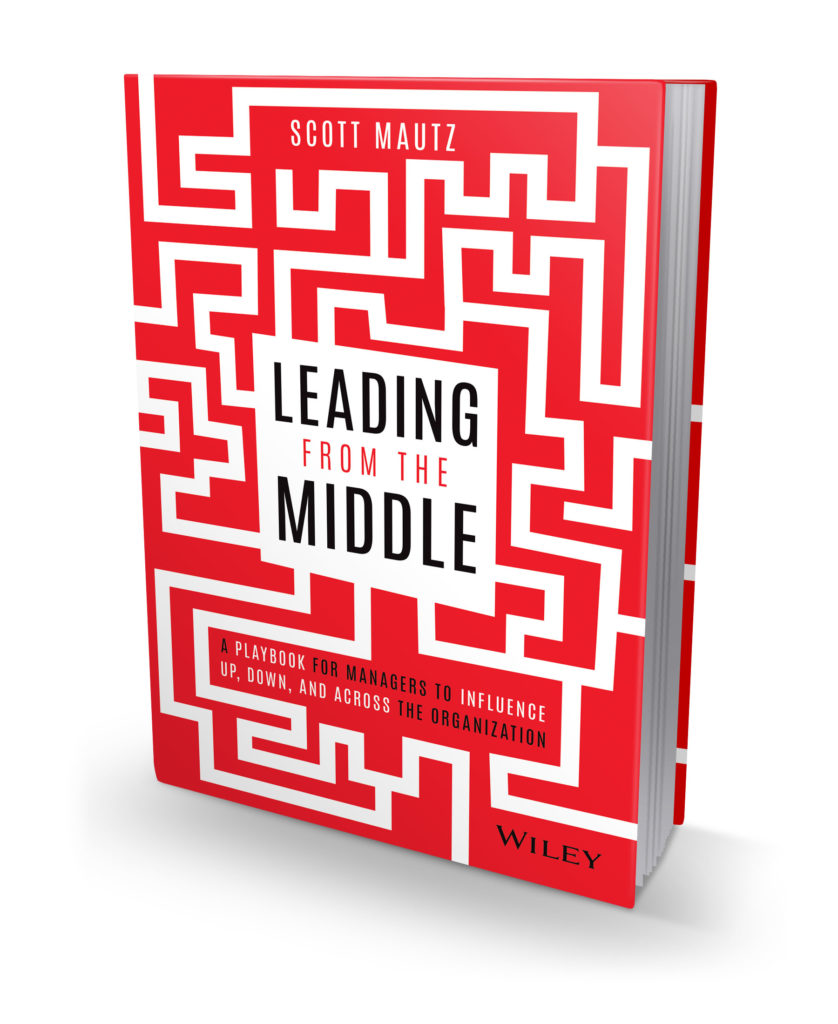
I know, you’re probably thinking, “Politics at work? Bleech.” But in my new book, Leading from the Middle: A Playbook for Managers to Influence Up, Down, and Across the Organization, I share that research shows the most successful managers play the game without imploding their soul.
I didn’t say you have to like it, but it’s undeniably true. It’s all about how you go about it. It starts with understanding that there’s a difference between being political, and being politically savvy.
Leaders who are political engage in backstabbing, shameless self-promotion, maneuvering, rumor mongering, coercing, and untruths. They put their own interests before everyone else’s and stand ready to gain personally at others expense.
Leaders who are politically savvy advance their own interests, but most often in conjunction with the greater good and never at the expense of it or others. Political savviness means understanding, not manipulating. It’s understanding the underlying context, issues, and personalities involved. It’s another tool for the others-oriented leader to leverage to serve their organization and get things done without turning a blind eye to worthy personal benefit.
While you should avoid political behavior when leading from the middle, or anywhere, it’s unwise not to sharpen your political savviness. After all, by being in the middle you’re inevitably going to discover, in all directions, pockets of egos, rivalries, pet projects, turf wars, hidden agendas, sacred cows, and opposing factions. You’re going to encounter people with differing levels of power, those who are extremely motivated by getting promoted and moving up (to a fault), those so passionate about their agenda that they’re willing to bend the rules to achieve it, and those hell bent on winning the internal war for resources.
You can choose to ignore all of this or be savvy about operating within this reality to maximize your effectiveness. What follows is a self-assessment: a 25-question quiz that defines political savviness through its questions, with the questions coded into four categories:
1. Self-Image (SI)
2. Organizational Awareness (OA)
3. Organizational Assets/Tensions (OAT)
4. Others-Orientation (OO)
The yes or no answers to these questions will help you self-assess on this skill, with every “no” pointing to an opportunity to build your political savviness. Answer each question with an honest “yes” or “no”, keeping track of the number of times you answer “yes” or “no”, then totaling both up. Then check the Key at the end to see what your total score means and what to do about it.
1. I’m able to exhibit impulse control and keep myself from blurting out whatever I think. (SI)
2. I understand how decisions really get made and how things really get done in my company. (OA)
3. I know who the gatekeepers are (those who provide access to what I need). (OA)
4. I know who the key influencers are (those who have great influence on what I need). (OA)
5. I know who the key decision makers are. (OA)
6. I know who the key stakeholders are (those who care most about a decision). (OA)
7. I seek out genuine, value-added reasons for connecting with people who impact my career. (SI)
8. I understand the cultural and behavioral norms in my company. (OA)
9. I know what behaviors are highly encouraged in my company. (SI/OA)
10. I know what behaviors are considered unacceptable in my company. (SI/OA)
11. I have developed an effective partnership with my boss. (OAT)
12. I know who will resist my agenda and who I need on my side to advance it. (OAT)
13. When I score a victory, I make sure the other side can save face. (OO)
14. I have a sponsor (someone to provide support for my advancing in the organization). (OAT)
15. I engage in subtle, warranted self-promotion (versus over-the-top, gratuitous self-promotion). (SI)
16. I have good self-awareness. (SI)
17. I have good situational awareness (I’m observant of what’s happening in the moment). (OO)
18. I have good organizational awareness (I know what image my company wants to portray). (OA)
19. I’m intentional about making other people look good. (OO)
20. I don’t change who I am on different occasions, just nuances of how I need to act. (SI)
21. I’ve built a network of friends and influencers across the company. (OAT)
22. I’ve built strategic alliances across the company. (OAT)
23. I’m open-minded and vocal about what I believe but mindful of how I express it. (SI)
24. I advocate strongly for my viewpoint, then commit to the final decision. (OO)
25. When in doubt, I let my values guide me to good decisions. (OO)
Your Score:
• You checked 20-25 Yes’s in total: Politically astute – You’re leveraging office politics in a highly effective and appropriate manner. Strengthen your strengths on this front.
• You checked 9-19 Yes’s in total: Politically competent – You’ve got game, but there’s plenty of low-hanging opportunity to be savvier and more effective. Turn those “no’s” to “yes’s.”
• You checked 0-8 Yes’s in total: Politically naïve (sorry) – You’ve got much to learn and practice to keep from getting steamrolled or self-sabotaging at work. Not to worry, political savviness is a skill that can be learned. Take it one step at a time; turn one “no” into a “yes” then move on to the next one.
Exciting News! – You Can Now PreOrder My Book, already an Amazon #1 BEST-SELLING new release in Management Science!

Leading from the Middle: A Playbook for Managers to Influence Up, Down, and Across the Organization (publication date is May 18th, 2021). Order here https://amzn.to/3as5tK8 OR… Get a massive BONUS BUNDLE by ordering 5 or more copies here: http://lftm.bulkbooks.com/ Check out a detailed book description here: https://bit.ly/2MLe5Do




That list of 25 is a good cheat sheet to keep tucked away for review on a regular basis.
Right on Tim – I hope a lot of people use it exactly as that – a cheat sheet to up their political savviness! (but not to up them being political)